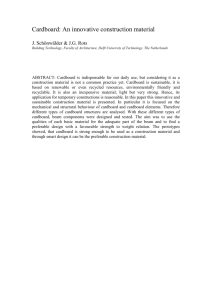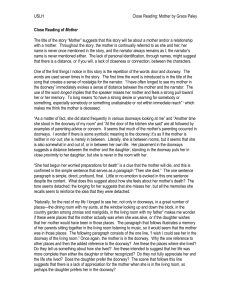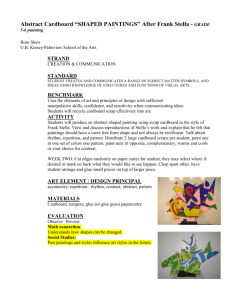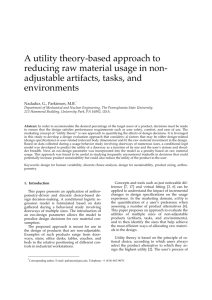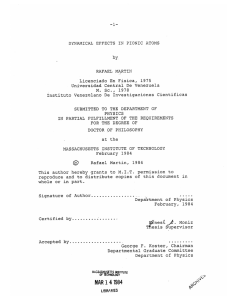the box man text
advertisement
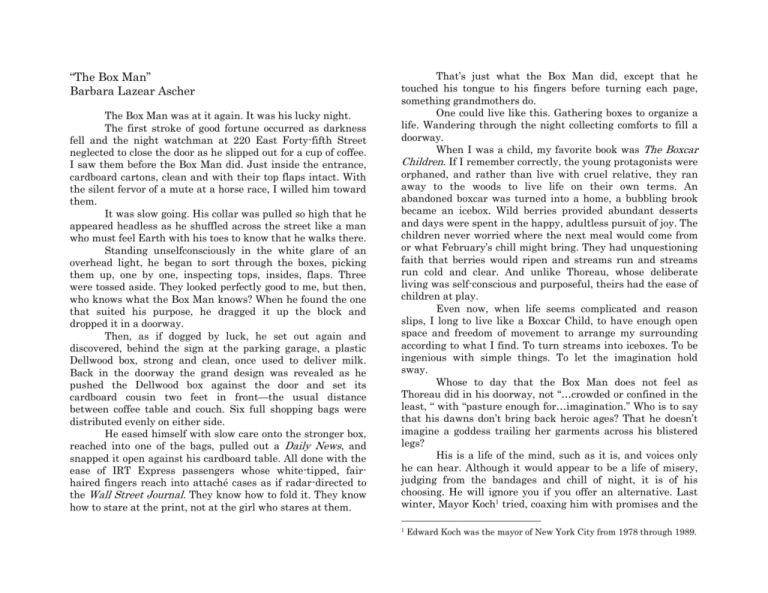
“The Box Man” Barbara Lazear Ascher The Box Man was at it again. It was his lucky night. The first stroke of good fortune occurred as darkness fell and the night watchman at 220 East Forty-fifth Street neglected to close the door as he slipped out for a cup of coffee. I saw them before the Box Man did. Just inside the entrance, cardboard cartons, clean and with their top flaps intact. With the silent fervor of a mute at a horse race, I willed him toward them. It was slow going. His collar was pulled so high that he appeared headless as he shuffled across the street like a man who must feel Earth with his toes to know that he walks there. Standing unselfconsciously in the white glare of an overhead light, he began to sort through the boxes, picking them up, one by one, inspecting tops, insides, flaps. Three were tossed aside. They looked perfectly good to me, but then, who knows what the Box Man knows? When he found the one that suited his purpose, he dragged it up the block and dropped it in a doorway. Then, as if dogged by luck, he set out again and discovered, behind the sign at the parking garage, a plastic Dellwood box, strong and clean, once used to deliver milk. Back in the doorway the grand design was revealed as he pushed the Dellwood box against the door and set its cardboard cousin two feet in front—the usual distance between coffee table and couch. Six full shopping bags were distributed evenly on either side. He eased himself with slow care onto the stronger box, reached into one of the bags, pulled out a Daily News, and snapped it open against his cardboard table. All done with the ease of IRT Express passengers whose white-tipped, fairhaired fingers reach into attaché cases as if radar-directed to the Wall Street Journal. They know how to fold it. They know how to stare at the print, not at the girl who stares at them. That’s just what the Box Man did, except that he touched his tongue to his fingers before turning each page, something grandmothers do. One could live like this. Gathering boxes to organize a life. Wandering through the night collecting comforts to fill a doorway. When I was a child, my favorite book was The Boxcar Children. If I remember correctly, the young protagonists were orphaned, and rather than live with cruel relative, they ran away to the woods to live life on their own terms. An abandoned boxcar was turned into a home, a bubbling brook became an icebox. Wild berries provided abundant desserts and days were spent in the happy, adultless pursuit of joy. The children never worried where the next meal would come from or what February’s chill might bring. They had unquestioning faith that berries would ripen and streams run and streams run cold and clear. And unlike Thoreau, whose deliberate living was self-conscious and purposeful, theirs had the ease of children at play. Even now, when life seems complicated and reason slips, I long to live like a Boxcar Child, to have enough open space and freedom of movement to arrange my surrounding according to what I find. To turn streams into iceboxes. To be ingenious with simple things. To let the imagination hold sway. Whose to day that the Box Man does not feel as Thoreau did in his doorway, not “…crowded or confined in the least, “ with “pasture enough for…imagination.” Who is to say that his dawns don’t bring back heroic ages? That he doesn’t imagine a goddess trailing her garments across his blistered legs? His is a life of the mind, such as it is, and voices only he can hear. Although it would appear to be a life of misery, judging from the bandages and chill of night, it is of his choosing. He will ignore you if you offer an alternative. Last winter, Mayor Koch1 tried, coaxing him with promises and the 1 Edward Koch was the mayor of New York City from 1978 through 1989. persuasive tones reserved for rabid dogs. The Box Man backed away, keeping a car and paranoia between them. He is not to be confused with the lonely ones. You’ll find them everywhere. The lady who comes into our local coffee shop each evening at five-thirty, orders a bowl of soup and extra Saltines. She drags it out as long as possible, breaking the crackers into smaller and smaller pieces, first in halves and then halves of halves and so on until the last pieces burst into salty splinters and fall from dry fingers onto the soup’s shimmering surface. By 6 pm, it’s all over. What will she do with the rest of the night? You can tell by the vacancy of expression that no memories linger there. She does not wear a gold charm bracelet with silhouettes of boys and girls bearing grandchildren’s birthdates and a chip of the appropriate birthstone. When she opens her black purse to pay, there is only a crumpled Kleenex and a wallet inside, no photographs spill onto her lap. Her children, if there are any, live far away and prefer not to visit. If she worked as a secretary for forty years in a downtown office, she was given a retirement party, a cake, a reproduction of an antique perfume atomizer and sent on her way. Old colleagues—those who traded knitting patterns and brownie recipes over the water cooler, who discussed the weather, health, and office scandal while applying lipstick and blush before the ladies’ room mirror— they are lost to time and the new young employees who take their places in the typing pool. Each year she gets a Christmas card from her ex-boss. The envelope is canceled in the office mailroom and addressed by memory typewriter. Within is a family in black and white against a wooded Connecticut landscape. The boss, his wife, who wears her hair in a gray page boy, the three blond daughters, two with tall husbands and an occasional additional grandchild. All assembled before a worn stone wall. Does she watch game shows? Talk to a parakeet, feed him cuttlebone, and call him Pete? When she rides the buses on her Senior Citizen pass, does she go anywhere or wait for something to happen? Does she have a niece like the one in Cynthia Ozick’s story “Rosa,” who sends enough money to keep her aunt at a distance? There’s a lady across the way whose lights and television stay on all night. A crystal chandelier in the dining room and matching Chinese lamps on Regency end tables in the living room. She has six cats, some Siamese, others Angora and Abyssinian. She pets them and waters her plethora of plants—African violets, a Ficus tree, a palm, and geraniums in season. Not necessarily a lonely life except that 3 am lights and television seem to proclaim it so. The Box Man welcomes the night, opens to it like a lover. He moves in darkness and prefers it that way. He’s not waiting for the phone to ring or an engraved invitation to arrive in the mail. Not for him P.O. number. Not for him the overcrowded jollity of office parties, the hot anticipation of a singles’ bar. Not even for him a holiday handout. People have tried and he shuffled away. The Box Man knows that loneliness chosen loses its sting and claims no victims. He declares what we all know in the secret passages of our own nights, that although we long for perfect harmony, communion, and blending with another soul, this is a solo voyage. The first half of our lives is spent stubbornly denying it. As children we acquire language to make ourselves understood and soon learn from the blank stares in response to our babblings that even these, our saviors, our parents, are strangers. In adolescence when we replay earlier dramas with peers in the place of parents, we begin the quest for the best friend, that person who will receive all thoughts as if they were her own. Later we assert that true love will find the way. True love finds many ways, but no escape from exile. The shores are littered with us, Annas and Ophelias, Emmas and Juliets, all outcasts from the dream of perfect understanding. We might as well draw the night around us and find solace there and a friend in our own voice. One could do worse than be a collector of boxes.


